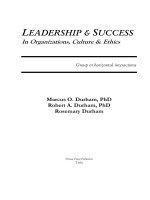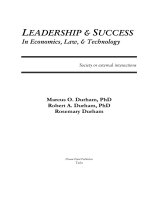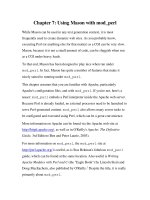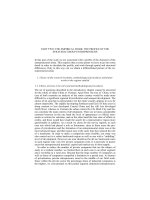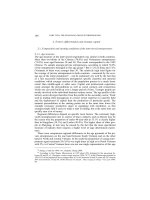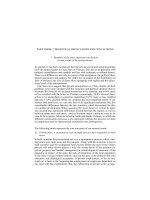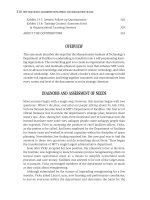Tài liệu Higher Education in ‘Business Administration’ in Spain: Adapting to the European Area of Higher Education * pptx
Bạn đang xem bản rút gọn của tài liệu. Xem và tải ngay bản đầy đủ của tài liệu tại đây (142.43 KB, 9 trang )
Recibido 10-05-08 · Aceptado 15-07-08 · Copyright © 2001 Asociación Española de Contabilidad y Administración de Empresas · ISSN: 0210-2412
REVISTA ESPAÑOLA DE FINANCIACIÓN Y CONTABILIDAD
Vol. XXXVII, n.º 139 · julio-septiembre 2008 · pp. 589-598
NOTAS TÉCNICAS 589
* Paper presented at I Convegno Nazionale of SIDREA, Siena 8-9 may 2008: 589 La Ragioneria e l Economia Aziendale:
dinamiche evolutive e prospettive di cambiamento . This paper has taken advantage from the activities of the UAM Expert
Group, which was set up to design a Business Administration degree. I acknowledge the valuable contributions of all mem-
bers of such group.
** Correspondence address: Departamento de Contabilidad, Facultad de Ciencias Económicas y Empresariales de la Universi-
dad Autónoma de Madrid, Campus de Cantoblanco, 28049 Madrid. Tel. +34 91 497 42 43. E-mail:
Higher Education
in ‘Business Administration’ in Spain:
Adapting to the European Area of Higher
Education
*
Educación Superior
en «Administración de empresas»
en España. La adaptación al Espacio Europeo
de Educación Superior
Leandro Cañibano
**
. Universidad Autónoma de Madrid
ABSTRACT In this paper, I analyse the steps taken in Spain to converge before 2010 with the fra-
mework set out by the ‘Bologna Declaration’ and the principles that govern the «European Area of
Higher Education». In particular, I refer to the studies in «Business Administration». Existing regu-
lation requires full integration of the Spanish higher education system with the «European Area of
Higher Education», having regulated the general aspects of the process. Taking this regulation as a
starting point, I will refer to the general principles that are being used to design the new curricula
required in the different degrees existing in the area under analysis, as well as the subjects, modules
and areas to be studied. I will also analyse the specifi c, generic and transferable competences that will
be acquired by future graduates.
KEYWORDS Bologna Declaration; European Area of Higher Education; Tuning Project; Business
Administration; Competences; Undergraduate and postgraduate.
RESUMEN En este trabajo se analizan los avances españoles para converger, antes de 2010, con
el marco establecido en la «Declaración de Bolonia» y con los principios que gobiernan el «Espacio
Europeo de Educación Superior» (EEES). Se abordan, en particular, los estudios de «Administración
de Empresas». La regulación actual obliga a realizar una integración total de la educación superior
española en el EEES, estando ya regulados los aspectos generales del proceso a seguir. Tomando co-
mo punto de partida esta regulación, se tratarán los principios generales que están utilizándose para
diseñar los nuevos currículos que requieren los diferentes grados en esta área analizada, así como las
asignaturas, módulos y áreas de estudio. También se tratarán las competencias genéricas, específi cas
y transferibles que serán adquiridas por los futuros graduados.
PALABRAS CLAVE Declaración de Bolonia; Espacio Europeo de Educación Superior; Proyecto de
ajuste; Administración de Empresas; Competencias; Graduados y postgraduados.
09_NT_LEANDRO_CAN IBANO.indd 58909_NT_LEANDRO_CAN IBANO.indd 589 19/9/08 09:27:5919/9/08 09:27:59
Leandro Cañibano
590 NOTAS TÉCNICAS
Higher Education in ‘Business Administration’ in Spain
1. HIGHER EDUCATION IN SPAIN WITHIN THE FRAMEWORK
OF THE «EUROPEAN AREA OF HIGHER EDUCATION»
As it is well known, the starting point of the process to achieve an integral harmoniza-
tion of the European higher education system was the «Sorbonne Declaration» of 1998,
which started a programme of convergence across different national European systems
of higher education, using as a platform the «Bologna Declaration» of 1999, which was
signed by the Ministers of Higher Education of 29 European countries, Spain included.
This declaration was followed by several others: Prague 2001, Barcelona 2002, Graz and
Berlin 2003, Bergen 2005, up until the more recent London 2007, that was signed by 46
Ministers. This process demands the adoption of a single comprehensive and comparable
system of degrees across Europe that improves the employability of European citizens
and improves the international competitiveness of the European education system. The
deadline to converge with this «European Higher Education Area» is 2010. The «Bolog-
na Declaration»particularly emphasizes the need to structure higher education into two
separate cycles: a fi rst one conductive to obtaining a degree, and a second one destined
to obtain a postgraduate degree, establishing systematic quality evaluations and imple-
menting Diploma Supplements.
At the same time, and within the European Union framework (Socrates Programme) se-
veral other initiatives have also appeared, amongst which we may mention the Project
«Tuning Educational Structures in Europe» (González and Wagenaar 2003), that consti-
tutes a basis for the implementation of university degrees under a new perspective that
emphasizes i) the development of generic and specifi c competences in the area, ii) the use
of the ECTS method not only as a transfer but also an accumulation system; and iii) quality
assurance and focus on learning, qualifi cation and performance.
In Spain, the Universities Organic Law of 2001
(1)
ordered the full integration of the Spa-
nish higher education system into the «European Area of Higher Education». Thereafter,
several Government Regulations were passed in relation to the fi nal structure of the un-
dergraduate degrees and postgraduate degrees (masters/doctorate), ending up with the
regulation of 29 October 2007 that currently applies:
i) Bachelor (undergraduate) degrees: general knowledge relevant to the labour market:
• The degrees pertain to one of the following areas of knowledge: a) Arts and Huma-
nities; b) Sciences; c) Health Sciences; d) Social Sciences and Law; e) Engineering
and Architecture.
• Basic knowledge in each area: 60 ECTS (minimum of 36 within own area). Table 1 below
shows, as an illustration, the basic subjects for the «Social Sciences and Law» area.
• Total ECTS: 240 (basic knowledge, compulsory and elective subjects, seminars, in-
ternships, supervised research projects, dissertations, other activities).
(1) The reform of this Law in 2007 emphasized the integration of Spanish higher education into the European Area of
Higher Education.
09_NT_LEANDRO_CAN IBANO.indd 59009_NT_LEANDRO_CAN IBANO.indd 590 19/9/08 09:27:5919/9/08 09:27:59
Leandro Cañibano
Higher Education in ‘Business Administration’ in Spain
NOTAS TÉCNICAS 591
TABLE 1
B
ASIC SUBJECTS: SOCIAL SCIENCES AND LAW
Anthropology
Political Science
Communication
Law
Economics
Education
Business
Statistics
Geography
History
Psychology
Sociology
ii) Postgraduate degrees: (I) Master: advanced knowledge relevant to the labour market
or providing initial research training.
• Total ECTS: between 60 and 120 ECTS (compulsory and elective subjects, seminars,
internships, supervised research projects, other assessed activities and fi nal Mas-
ters dissertation of between 6 and 30 ECTS.)
• Regulated professional activities (i.e., Chartered Accountant): will take into account
both national and European regulations.
iii) Postgraduate degrees: (II) Doctorate: research training
• Doctorate programme: period of training (Master) and supervised research.
The implementation of this new structure, adapted to the «European Area of Higher Edu-
cation», is already underway. Several Spanish universities, such as my own university: the
Autonomous University of Madrid has already started experimental ECTS groups. Howe-
ver, the majority of the Universities will fi rst implement this system in the next academic
year 2008-2009 or in 2009-2010.
It is unnecessary to insist on the diffi culties that such a change represent: lack of physical
and technological means in different centres; traditional views from both lecturers and
students, adapting to new means and styles of learning and teaching; embracing new ob-
jectives such as employability, the removal of an intermediate degree (Diploma, three year
degree) that exist in many fi elds (e.g., Engineering and Business Administration); restruc-
turing the degrees in terms of contents and subjects, the requirements to submit the new
degrees for evaluation by a specialized Governmental Agency, etc. All these diffi culties
encountered in the process explain that, despite our wishes that the harmonization process
be completed soon, both the Government and the Universities have come to many dead
alleys. After many debates that have preceded this moment, we have reached the time
when we must fully face the implementation stage if we are to meet the established deadli-
ne, which requires convergence with the ‘European Area of Higher Education’ by 2010.
09_NT_LEANDRO_CAN IBANO.indd 59109_NT_LEANDRO_CAN IBANO.indd 591 19/9/08 09:27:5919/9/08 09:27:59
Leandro Cañibano
592 NOTAS TÉCNICAS
Higher Education in ‘Business Administration’ in Spain
2. SOME SPANISH STUDIES ON THE DEGREE OF «BUSINESS
ADMINISTRATION» WITHIN THE «EUROPEAN AREA OF HIGHER
EDUCATION»
Against this previously explained background of European developments and full adoption
in Spain, different initiatives were started in several university and professional sectors of
the country to study the existing situation, aiming at building knowledge that will permit
undertaking the reform in the best possible way. Some of these initiatives refer specifi cally
to ‘Business Administration’ studies. We refer to them in this section. In the next section we
will review the specifi c actions already underway in Spanish Universities.
T
HE AECA STUDY
Given the employability objective that was highlighted by the «Bologna Declaration», the
Spanish Accounting and Business Administration Association (AECA)
(2)
promoted a study
about higher education in ‘Business Administration’ (García and Vico 2004) that analysed
to what extent the different subjects of the degree are well adapted to the demands of the
labour market.
We should mention that, according to the study promoted by the Minister of Science and Edu-
cation on the Social demands and their infl uence in the planning of degrees in Spain (Funda-
ción Universidad Empresa 2005), the degree with the highest demand by Spanish companies
was precisely the one we are referring to in this paper, as shown in Table 2 below:
T
ABLE 2
U
NIVERSITY DEGREES DEMANDED BY SPANISH COMPANIES
Degree in Business Administration 39,9%
Degree in Law 27,8%
Degree in Economics 23,7%
Industrial Organization Engineer 23,7%
Electrical Engineer 19,6%
Diplomado (3-year degree) in Business Administration 18,2%
Forest Engineer 17,6%
Technical Engineer (Diplomado) Public Structures 14,2%
Degree in Psychology 13,5%
Technical Engineer (Diplomado) Electrical 10,8%
Source: Fundación Universidad Empresa (2005).
The study undertaken by AECA starts by researching into i) the existing higher education
degrees offered by Spanish universities, and ii) the jobs demanded and advertised by Spa-
nish fi rms. Using this information, the study analyzes how well the content of the studies
of the degree in «Business Administration» respond to the demands of the labour market.
Based on this analysis, the study proposes new curricula that would be better adapted to
the requests of the labour market, considering also the specifi c, generic and transferable
competences of the degree.
(2) This association has over 4.000 members, 500 fi rms and 3.500 individuals, managers, independent professionals and
academics. Founded in 1979, its main aim is to contribute to the development of research in business studies and to improve
the management and information systems of Spanish fi rms.
09_NT_LEANDRO_CAN IBANO.indd 59209_NT_LEANDRO_CAN IBANO.indd 592 19/9/08 09:27:5919/9/08 09:27:59
Leandro Cañibano
Higher Education in ‘Business Administration’ in Spain
NOTAS TÉCNICAS 593
To develop their proposal they examined, fi rst, the curricula offered by 47 different univer-
sities. They structured the subjects in 11 areas. Second, they analysed the ads (400) placed
by Spanish fi rms in the best known Spanish newspapers during the third trimesters of 2000
and 2001, to systematize the type of jobs that were being offered, and thus, the demands of
the labour market. These job offers were fi nally classifi ed into 4 separate categories of em-
ployment. From this information, to determine the relative weights of each of the subjects
of the structure in terms of their relevance to the labour market, they requested the opinion
of academics with over 8 years of experience (3 in the subject) as well as that of business
professionals working in each of the 4 different employment categories (110 total).
The competences that are inherent to the degree of ‘Business Administration’ are as shown
in Table 3 below. Table 4 shows the list of subjects and their corresponding relative weights
and the types of employment.
T
ABLE 3
C
OMPETENCES
Specifi c
Technical
• Accounting
• Finance
• Marketing
• Organization/ Human Resources
Environment
• Economics
• Law
• Sociology
• History
Instrumental
• Math/Statistics
• Computer Systems
Generic/Transversal
• Foreign Languages
• Oral and written expression
• Creativity and innovation
• Communication capability
• International environment
• Critical thinking
• Adapting to change
• Work in group/under pressure
• Time management
• Ethical values
Transferable
• Internships
• Real environment simulation
TABLE 4
A
CADEMIC STRUCTURE RELEVANT TO THE LABOUR MARKET
Subjects
Technical
• Accounting (13,4%)
• Finance (11,9%)
• Marketing (13,8%)
• Organization (17,9%)
Environment
• Economics ( 9,1%)
• Law ( 7,9%)
• Sociology ( 8,3%)
• History ( 1,0%)
Instrumental
• Math
( 6,0%)
• Computers ( 5,8%)
• Languages (4,9%)
Employment types
• Accounting-Finance
• Marketing
• Organization
• Global
09_NT_LEANDRO_CAN IBANO.indd 59309_NT_LEANDRO_CAN IBANO.indd 593 19/9/08 09:27:5919/9/08 09:27:59
Leandro Cañibano
594 NOTAS TÉCNICAS
Higher Education in ‘Business Administration’ in Spain
CONFEDE WHITE BOOK
The Conference of Business and Economics Faculties Deans
(3)
prepared a «White Book
of undergraduate studies in Business and Economics» (CONFEDE 2004), in collaboration
with several business and professional institutions. This report was later adopted by the
Government specialized Agency (ANECA) as a fundamental starting point. The report, that
starts with an introductory section that provides international, historical and statistical
comparisons, and after analysing the labour market success of university graduates in the
previous fi ve years, arrives to a proposal for the curricula of the degree in «Business Ad-
ministration» that is very similar to the one proposed by AECA and that we just reviewed
above, since there are no differences in the proposed subjects and there are very minor
differences in relation to their associated weights. The same thing can be said about the
competences analysed.
After examining the existing postgraduate studies, the report discusses potential postgra-
duate degrees at the Masters level that could be offered in the context of the «European
Area of Higher Education», although it limits the discussion to the most consolidated de-
grees, perhaps because they previously were specialized degrees such as «Market Re-
search Techniques» or «Actuarial and Financial Sciences», or perhaps because they were
associated to European Union regulated professions, such as that of «Chartered Accoun-
tant», or even perhaps due to the depth of the existing market demand for those degrees,
as is the case with International Business, Business Tax or Business Management
O
THER STUDIES
Aside from the previously mentioned studies, there are several other reports that deal
primarily with the job market success of university graduates in general (Accenture 2001;
Fundación Universidad Empresa 2005; ANECA 2008), or of graduates of Business and Eco-
nomics Faculties (Marín, 2008), and the relationship between university and the business
world (Accenture and Universia 2007). We can conclude that these studies reach similar
conclusions to the other studies that were previously reviewed, so we will not refer to them
in further detail, aside from mentioning their existence.
3. IMPLEMENTATION OF THE DEGREE IN «BUSINESS ADMINISTRATION»
IN SPANISH UNIVERSITIES
In this section, we will refer fi rst to the undergraduate studies (degrees), and then, to the
postgraduate studies (masters and doctorates).
U
NDERGRADUATE STUDIES
We should start by highlighting the fact that it would be more correct to refer to the set of
undergraduate degrees in «Business Administration» rather than to a single degree. To
this date, we know of several undergraduate degrees that will start next year in Spanish
Universities. Aside from the degree in «Business Administration», we can also mention
(3) In Spain, there are 75 university centres of this nature, 54 public ones and 21 private.
09_NT_LEANDRO_CAN IBANO.indd 59409_NT_LEANDRO_CAN IBANO.indd 594 19/9/08 09:27:5919/9/08 09:27:59
Leandro Cañibano
Higher Education in ‘Business Administration’ in Spain
NOTAS TÉCNICAS 595
several others: a degree in «Tourism», a degree in «Accounting and Finance», and yet
another in «Human Resources Management».
The degree in «Tourism» originates from the existing university three-year degree (Diplo-
ma) «Diplomado in Tourism» that exists since the sixties in the professional sector and that
was incorporated to the university in the nineties. The degree in «Human Resources Mana-
gement» also has a professional origin, and is also currently a diploma (three-year degree)
that was originally oriented towards the social and legal issues of work forces, and that in
recent years has moved towards the business management of human resources. Lastly, the
degree in «Accounting and Finance» is a more recent initiative, inspired in existing practi-
ces in many UK Universities, and that some Spanish Universities have recently started.
Notwithstanding the previous discussion, given that the degree in «Business Administra-
tion» is the common-place degree in this fi eld at Spanish universities; we will focus on that
degree in this section, although we should mention that the general aspects of our discus-
sion apply to any of the aforementioned degrees.
Even though each university has full autonomy to prepare their curricula, the fact that the
curricula is evaluated by the Government specialized Agency (ANECA), generates a certain
tendency to follow the guidelines established in the ANECA White Book. The details that
follow refer to the project currently underway at the Autonomous University of Madrid.
Thus, the projects at other Spanish universities might be slightly different, although not
too different, in particular with reference to the basic knowledge and compulsory subjects,
and of course, to the number of total ECTS that, as was previously noted, have to add up
to a total of 240.
The content of the studies resulting in the award of a degree in «Business Administration»
is structured in the fi ve separate modules that we detail in Table 5 below, where we also
show the areas that pertain to each of these modules, areas that are, in turn, split into di-
fferent subjects, over which we will provide some details, but only as examples.
T
ABLE 5
M
ODULES AND AREAS
BASIC KNOWLEDGE
60 ECTS
Q
UANTITATIVE
METHODS
21 ECTS
E
CONOMIC ANALYSIS
AND
BUSINESS
ENVIRONMENT
33 ECTS
B
USINESS
ADMINISTRATION
66 ECTS
P
ROFESSIONAL
PROFILES
60 ECTS
Statistics
Law
Sociology
History
Economics
Communication
Business (princi-
ples, accounting)
Math,
Computers
Statistics
Econometrics
Math
Economics (micro
and macro)
Business environ-
ment (economic,
commercial, tax)
Business (accoun-
ting, fi nance, orga-
nization, marketing)
Functional:
Accounting,
Finance,
Marketing,
Organization
Transversal:
International,
Innovation,
Corporate social
responsibility
-
Internships
Dissertation
Others
09_NT_LEANDRO_CAN IBANO.indd 59509_NT_LEANDRO_CAN IBANO.indd 595 19/9/08 09:27:5919/9/08 09:27:59
Leandro Cañibano
596 NOTAS TÉCNICAS
Higher Education in ‘Business Administration’ in Spain
Regarding the specifi c subjects, we provide as an example in Table 6 below: a relation
of the subjects of the area of knowledge of «Accounting», distinguishing between those
subjects that are compulsory and those that are elective (associated with the Professional
Profi les module).
T
ABLE 6
A
CCOUNTING SUBJECTS
Compulsory:
Introduction to Accounting
Financial Accounting
Management Accounting
Financial Statements Analysis
Elective:
Consolidated Financial Statements
Auditing
Budget control
Accounting Information Systems
Tax accounting
International Accounting
Others
What we have detailed in this section, in terms of modules, areas and subjects, is not a
drastic change from the previous system, although perhaps, it is slightly better structured
and links better with the demands of the labour market. However, what would represent a
vast improvements is the focus on competences if we manage to pass on not just facts to the
students, but also knowledge, and particularly know-how that not only relates specifi cally
to ‘Business Administration’, but that can, more generally, be transferred to any fi eld of
knowledge.
P
OSTGRADUATE STUDIES
We briefl y mentioned the guidelines set out in the White Book with respect to the postgra-
duate studies in our fi eld of study. Given that this is a process currently underway and that
there is wide fl exibility and autonomy to develop or not programmes of this nature, it is
not easy to have a global knowledge that permits discussing in detail the state of the ques-
tion. We can say that, currently, there are many programmes that have been approved by
ANECA or that will soon be approved and that offer degrees at the Master and Doctorate
level with the following denominations: Actuarial and Financial Sciences, Research Market
Techniques, Business Administration, Accounting and Finance, Auditing and Capital Mar-
kets, Economics and Finance, Economics and Innovation Management.
With regards the Autonomous University of Madrid, the Masters and Doctorate Program-
mes structured in accordance to the guidelines of the «European Area of Higher Educa-
tion» in the fi eld of «Business Administration» are as follows: Economics and Innovation
Management (Across-Universities and currently underway), Accounting, Auditing and Ca-
pital Market (Across Universities and starting in 2009), Business Administration (starting
in 2010).
09_NT_LEANDRO_CAN IBANO.indd 59609_NT_LEANDRO_CAN IBANO.indd 596 19/9/08 09:27:5919/9/08 09:27:59
Leandro Cañibano
Higher Education in ‘Business Administration’ in Spain
NOTAS TÉCNICAS 597
4. SUMMARY AND CONCLUSIONS
Taking the basic guidelines established by the «Bologna Declaration» and that constitute
the principles that govern the «European Area of Higher Education» as a starting point, in
this discussion, we have presented in a summarised way the steps taken by Spanish Uni-
versities to converge with the European Higher Education Area within the given deadline
of 2010. Current Spanish Universities Law requires full integration of the Spanish higher
education system with the «European Area of Higher Education», whilst later regulatory
efforts by the Government set out the basic guidelines to design the undergraduate and
postgraduate degrees. The duration of these studies has been set using ECTS: 240 for the
degrees, between 60 and 120 ECTS for the Master degrees. The subjects to be taught in
each of the basic knowledge areas and the need to evaluate the curricula of the degrees
have also been regulated.
We have discussed the existence of a diversity of undergraduate degrees in the area under
analysis. However, the most well-known and generalised across Spanish universities is the
degree in «Business Administration». This last degree will consists of fi ve modules: basic
knowledge, quantitative methods, economic analysis and business environment, business
administration and professional profi les. We have also discussed the areas that integrate
each of the modules, and, as an example, we have shown the subjects that compose one
of the areas. In addition, we have shown that the focus on competences should represent
a vast improvement with respect to the prior system. Finally, we have mentioned the exis-
tence of some Master and Doctorate programmes already adapted to the «European Area
of Higher Education» and that are either underway or will be in 2009 or 2010.
Given the rapid adaptation to the regulatory changes of 2007 and subsequent governmental
regulations, it is perfectly possible that by 2010, the degrees offered by Spanish universities
will be fully adapted to the guidelines set by the «European Area of Higher Education».
REFERENCES
ACCENTURE. 2001. Expectativas de los estudiantes universitarios ante su inserción laboral, Madrid.
A
CCENTURE and UNIVERSIA. 2007. Las competencias profesionales en los titulados. Contraste y diálogo
Universidad-Empresa, Madrid: Centro de Alto Rendimiento Accenture/Universia.
A
GENCIA ESPAÑOLA DE EVALUACIÓN DE LA CALIDAD Y ACREDITACIÓN, ANECA. 2008. Informes sobre inserción labo-
ral de titulados universitarios, ANECA, Madrid, disponible en: />formes.asp (consultado el 9 de julio de 2008).
CONFEDE. 2004. Libro Blanco del título de grado en Economía y Empresa, ANECA, Madrid. Disponible
en (consultado el 8 de julio de 2008).
F
UNDACIÓN UNIVERSIDAD EMPRESA. 2005. Las Demandas sociales y su infl uencia en la planifi cación de las
titulaciones en España, Madrid: Ministerio de Educación y Ciencia-Fundación Universidad Empresa.
G
ARCÍA, M. A., and VICO, A. 2004. La Formación Universitaria en Administración y Dirección de Empresas:
Análisis de su adaptación al mercado de trabajo y propuesta de Plan de Estudios, AECA, Madrid.
G
ONZÁLEZ, J., and WAGENAAR, R., Eds. 2003. Tuning Educational Structures in Europe, Bilbao: Universi-
dad de Deusto.
MARÍN, S., Ed. 2008. Los economistas ante el Espacio Europeo de Educación Superior, Madrid: Consejo
General de Economistas.
09_NT_LEANDRO_CAN IBANO.indd 59709_NT_LEANDRO_CAN IBANO.indd 597 19/9/08 09:27:5919/9/08 09:27:59

